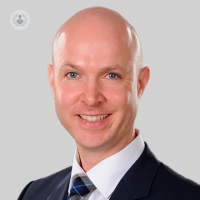What is causing your loss of balance?
Written in association with:Developing sudden symptoms of dizziness and loss of balance can be confusing and frightening. Luckily, it’s not usually a serious condition and may be due to a problem with the signals the ear sends to the brain or there’s an infection of the inner ear. Professor Owen Judd, a highly-trained consultant ENT surgeon with a special interest in balance disorders, explains a few causes as to why you might be experiencing these symptoms.


Benign Paroxysmal Positional Vertigo (BPPV)
This disorder occurs after damage to the inner ear. The inner ear contains five separate organs in one. Three of the organs are called semicircular canals that detect rotation of the head (such as nodding or shaking the head from side to side), and the two other organs detect movement of the head against gravity, either in the horizontal direction (driving in a car), or in the vertical direction (falling or going up in a lift).
The last two of these organs are able to detect movement against gravity, as they have chalk crystals on them that are heavy and move with gravity when we change position.
In BPPV, some of these chalk crystals can loosen and fall into one of the semicircular canals, where they’re not supposed to be. When too many crystals gather in one of the canals they interfere with the normal fluid movement which causes the inner ear to send incorrect signals to the brain, giving us a sensation of vertigo.
Causes
BPPV can be caused by anything that may cause these crystals to loosen and fall into a canal, such as a head injury or bump to the head, or inflammation of the inner ear.
Treatment
Treatment for BPPV involves a special manoeuvre when the head is turned in such a way as to allow the crystals to fall back out of the affected semicircular canal.
Labyrinthitis
This is a very old and outdated term. True labyrinthitis (with sudden hearing loss), tinnitus and vertigo is actually very rare. What most people have is a condition called vestibular neuronitis.
Causes
This condition is caused by a virus causing inflammation and swelling of the nerve of balance, the vestibular nerve.
It causes vertigo and dizziness only with no hearing loss or tinnitus. It can come on suddenly with vertigo, nausea and vomiting and lasts for a few days to a week or two at a time with continuous vertigo and nausea.
Treatment
As this is often caused by a viral infection, you will not usually be given any treatment other than short term medication to relieve symptoms as you recover. Antibiotics will not work in this condition and there is no evidence that antiviral medications work either. Like a cold, it will simply get better on its own.
Meniere’s disease
This is actually a very rare condition and is hugely over-diagnosed.
Most patients diagnosed with Meniere’s disease don’t actually have the condition, as far more common conditions, such as vestibular migraine are more likely and can present in a similar way.
Although Meniere’s disease has been described for more than 200 years, we still do not know exactly what it is or how it is caused. We think it’s related to too much fluid within the inner ear but many now believe that Meniere’s disease may actually be a number of conditions that all happen to present in a similar way.
It is a condition that affects the inner ear only. Most patients describe sudden onset episodes of spinning vertigo and is accompanied by a drop in hearing and an increase in the intensity of tinnitus in the affected ear. In addition, patients describe a feeling of pressure or fullness in the ear as well.
Meniere’s disease is diagnosed from understanding the timescale of an attack. It must last from a few minutes to a few hours at a time, but not more than 12 hours. There also needs to be a true drop in hearing proven by changes on formal hearing tests either during or between attacks.
As Meniere’s only affects the ear, if there are any other symptoms in the rest of the body during the episodes, such as visual symptoms, it mean that the diagnosis is unlikely to be Meniere’s disease.
Treatment
Properly diagnosed Meniere’s disease can then be treated by a combination of treatments. This includes lifestyle and dietary changes, hearing aids and hearing therapy, balance exercises and rehabilitation and very rarely surgery in the form of injections into the ear.
There is currently no strong evidence that any medication helps the condition. Previously, a drug called Betahistine was frequently used for Meniere’s disease but there is no evidence that this is effective and may only work as a placebo.
If you are experiencing any of these symptoms and want to see a specialist, visit Professor Owen Judd's profile and book a consultation with him.


